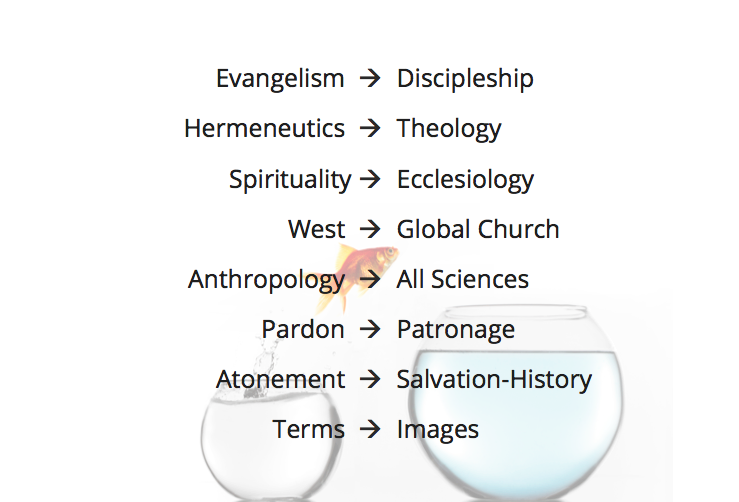8 Tips for Doing “Honor-Shame Theology”
How can we develop an “honor-shame theology” for today? How might be better explain the gospel in honor-shame contexts? Here are 8 practical tips to help you better utilize honor-shame in global ministry.
This post summarizes part of my plenary talk at the 2017 Honor-Shame Conference. A full-length webinar video is available here.
1. Missions: From Evangelism to Discipleship.
Many Christian workers engage honor-shame for its evangelistic utility. Honor-shame most certainly does impact evangelism, but limiting its value to evangelism truncates our theology and undermines the important task of making disciples. Honor and shame transform our understanding of the gospel, from conversion message to discipleship life. As we understand the gospel rightly, honor-shame is not merely about cross-cultural communication, but a matter of ethics and kingdom living. An honor-shame perspective enhances our gospel presentations by emphasizing the ethical and communal dimensions inherent to the gospel. So, use honor-shame to make disciples, not just more converts.
2. Biblical Studies: From Hermeneutics to Theology.
In the arena of biblical studies, honor-shame is foremost a hermeneutical tool, a fresh lens for interpreting the Bible. We are indeed grateful for how an honor-shame perspective reveals cultural nuances in Scripture. However, the concepts of honor and shame fundamentally are theological concepts. They illuminate the theology of the Bible, not merely the culture of biblical societies. Honor and shame are conceptual foundations in biblical theology. Without abandoning hermeneutics, we must also consider how honor-shame informs theology and doctrine.
3. Pastoral Care: From Spirituality to Ecclesiology.
Western Christians address shame in the context of personal spirituality and psychology. In Western culture, shame is a negative internal emotion, a low self-esteem. The solution to shame is feeling better about yourself by not worrying about others’ opinions. However, the biblical solution to shame is not detachment but community. In pastoral care, an honor-shame perspective produces healthy groups, not merely emotionally-fulfilled individuals. As you shepherd God’s people, use honor-shame insights to enhance community (i.e., ecclesiology), not just individual spirituality.
4. The Creators: From The West to The Global Church.
The variety of honor-shame cultures require a variety of honor-shame theologies. So, our theologies must offer biblical perspectives about honor-shame for diverse contexts.
For a global conversation we must address two obstacles that hinder Majority World believers from developing biblical theology in honor-shame terms. In a “Catch-22” way, the traditionalism of honor-shame cultures stunts the development of an honor-shame theology. Also, we are all a “fish-in-water” when it comes to our culture. Few Majority World Christians have reflected on their cultural grammar of honor and shame. Overcoming these cultural obstacles will help us move towards global honor-shame theologies.
5. The Tools: From Mediterranean Anthropology to All Sciences.
Scholars who research honor and shame in the Bible often rely upon anthropological models. These are helpful, but they must not determine or limit our understanding of honor and shame. We must allow other insights to shape the conversation. Fortunately, research about honor and shame has surged in fields like cultural psychology, sociology, neurology, and ethics. Theology and missiology must draw from a fuller range of the social sciences to develop a richer biblical understanding of honor and shame. As you reflect on honor and shame in the Bible, think beyond the categories of cultural anthropology.
6. The Content: From Pardon to Patronage.
All theological systems require conceptual metaphors to explain salvation. Needless to say, Western theology emphasizes courtroom and legal metaphors. Though certainly biblical, legal metaphors hardly resonate with people from honor-shame contexts. A better conceptual metaphor for salvation might be patronage.
Patronage is a viable metaphor for biblical salvation because (1) there is a biblical precedent for explaining salvation as patronage and (2) the metaphor of patronage intuitively makes sense to people in collectivistic cultures. An honor-shame theology will explain salvation in terms of patronage, not just pardon.
7. The Scope: From Atonement to Salvation-History.
The Western preoccupation with how Jesus saves makes the mechanics of the atonement a central concern in most theology. We must indeed explain how the death of Jesus addresses the problem of shame (both ours and God’s), but an exclusive focus on the atonement can neglect other aspects of theology. A solution is to focus on salvation-history, to retell the entire biblical story from an honor-shame perspective. This forces us to address a broader range of theological topics—e.g., the fall, Israel, the life of Christ, Pentecost. As you develop an honor-shame theology, focus on explaining salvation-history, not just the cross.
8. The Language: From Terms to Images
A final consideration is our language for presenting these ideas. People often assume the best strategy to help a Muslim or an Asian understand the gospel is to repeat the words “honor” and “shame.” These terms get sprinkled into our gospel presentations like chocolate chips that make an ice cream sundae look tastier. The terminology of “honor” and “shame” can be helpful for cognitive understanding in teaching contexts. But verbal images like stories or metaphors better explain honor and shame concepts. They communicate effectively. To communicate theology from an honor-shame perspective, use cultural images that evoke people’s innate sense of honor and shame.
Conclusion
 We have done a wonderful job in leveraging honor-shame, but there are many new insights to work out in developing an “honor-shame theology.”
We have done a wonderful job in leveraging honor-shame, but there are many new insights to work out in developing an “honor-shame theology.”
For a complete explanation of these points, watch the webinar video “8 Proposals for Honor-Shame Theology.”


Could you share more specifically what you mean when you say “patronage?”
Thanks!
Patronage is explained a bit in the video under that point. Also, this post includes an explanation: https://honorshame.com/the-meaning-of-faith/
This is one of the things that has bothered me as I’ve read from this website and as I attended the Honor-Shame conference: while honor-shame is certainly biblical, there is the danger of swinging the pendulum too far in the opposite direction. And I think that often happens on this site. Honor-shame is biblical, but Scripture does not only speak through honor-shame alone. The more I read Scripture after having been exposed to the idea of honor-shame, I see the Lord speaking through honor-shame, but also through guilt-innocence, and even fear-power and purity-pollution. And He also challenges them all. So develop an “Honor-shame theology” creates an imbalance that is just as faulty as a “Guilt-innocence theology.” Rather, we should be pursing a holistic understanding of Scripture that incorporates guilt-innocence, honor-shame, fear-power, and purity-pollution and puts them all in their proper place. That, I believe, was a major blind spot in the conference; and it would seem to be a major blind spot for the site here. And I say that with all due respect and appreciation for everyone involved with both.
Jeb, thanks for your comments. Since I often hear this concern from people, I’m going to address it in an upcoming post. Stay tuned!
I look forward to it! And please know that I mean no disrespect; nor was I trying to be argumentative. I’ve learned much, both through this website and through the conference. So please don’t take my comments as trying to discount how important an understanding of honor-shame is for our understanding of Scripture!